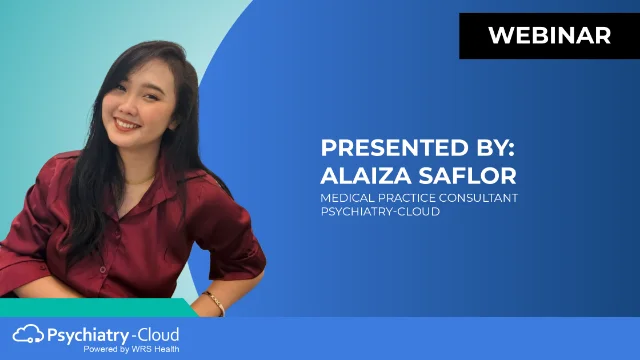Key Takeaways
- Behavioral health diagnosis codes must be selected and applied precisely to avoid denials and underpayments.
- Linking accurate CPT and ICD-10 codes supports medical necessity and ensures proper payment.
- Clean documentation and pre-authorization processes reduce delays and improve revenue flow.
- Struggling with claim denials? Download our step-by-step guide to allowable mismatches—and learn how to prevent them before they impact your revenue.
As a psychiatrist, you need both quality care and timely reimbursement to build a sustainable practice. Many behavioral health practices face delays or denials—often due to inaccurate or incomplete diagnosis coding. You can improve your claims success by aligning CPT and ICD-10 codes to support medical necessity and leaning on speciality-specific billing experts.
When your team or billing partner knows how to apply behavioral health diagnosis codes more strategically, your practice can stay financially healthy while continuing to provide top-tier care.
Table of Contents
Build Coding Accuracy Into Every Session
According to the American Academy of Professional Coders (AAPC), a significant number of behavioral health claim denials result from inaccurate or incomplete coding. Unlike physical medicine, mental health services often require multiple overlapping diagnoses and complex visit types that are more nuanced.
Here’s how to build accuracy into your billing process:
- Use specialty-specific EHR templates for conditions like generalized anxiety disorder, ADHD, or PTSD.
- Pre-load CPT codes for mental health that are commonly used in your practice, such as 90791 (Psychiatric Diagnostic Evaluation) or 90837 (60-minute psychotherapy session).
- Link ICD-10 diagnoses to documented symptoms and session notes to support medical necessity.
Clean coding begins with clean documentation. When providers and billing staff are aligned, reimbursements follow more smoothly.
Train Your Team on Behavioral Health-Specific Situations
Generalist billing staff may not fully understand the intricacies of psychiatric care. Behavioral health reimbursement requires familiarity with CPT coding details like time-based psychotherapy services, intake evaluations, and psychiatric medication management.
For example:
- A therapy session that runs longer than 60 minutes (90837) must be properly documented with session time and medical necessity.
- Telehealth visits must include appropriate place-of-service mental health CPT codes and modifiers (e.g., modifier 95).
- Intake assessments may be denied if CPT 90791 (psychiatric diagnostic evaluation with no medical services) is billed more than once without clear justification.
Invest in staff education that goes beyond the basics. The more your team understands the clinical services provided, the fewer errors you’ll see on claims.
Align CPT and ICD-10 Codes to Demonstrate Medical Necessity
Each behavioral health service must be tied to a clearly documented diagnosis. Misalignment is one of the top reasons for denied claims.
To improve claim success:
- Match each CPT code with the most specific ICD-10 diagnosis available. For example, instead of using F41.9 (Anxiety disorder, unspecified), use F41.1 (Generalized anxiety disorder) if applicable.
- Avoid “unspecified” codes unless there is no better option—and ensure documentation supports it.
- Capture co-occurring diagnoses such as depression and substance use disorder if relevant to the treatment plan.
Precise coding allows payers to understand the clinical rationale for services rendered—and helps prevent medical necessity denials.
Need help with claim denials? Download our complete guide on allowable mismatches and how to avoid them.
Know Your Modifiers (and Use Them Correctly)
Modifiers help tell the full story of a patient encounter. Used incorrectly or omitted, they can trigger claim rejections.
Modifiers to understand in behavioral health:
- Modifier 25: Used when a separately identifiable E/M service is performed on the same day as psychotherapy.
- Modifier 59: Indicates a distinct procedural service (e.g., therapy and testing on the same day).
- Modifier 95: Designates a synchronous telemedicine service.
Check payer-specific modifier rules—some have proprietary requirements for telehealth or bundled services.

Use Denials as Diagnostic Data
Each denial tells a story—and offers a chance to improve. Don’t just resubmit; analyze.
Ask questions to find the root of the problem:
- Are specific CPT or ICD-10 codes repeatedly denied?
- Are rejections tied to one provider or one payer?
- Are prior authorizations missing for certain procedures?
By identifying patterns, your team can correct upstream issues and prevent recurring revenue disruptions.
Automate Eligibility and Pre-Auth Checks
Behavioral health practices often face prior authorization requirements for intensive services like neuropsychological testing or IOPs (intensive outpatient programs). Manual verification slows down care and billing alike.
Automating these tasks allows you to:
- Verify insurance eligibility as soon as appointments are scheduled.
- Flag services that require authorization based on payer rules.
- Route flagged items to billing staff or a virtual assistant for action.
Tools like Psychiatry-Cloud’s smart billing features can drastically reduce admin time while protecting your bottom line.
Document for Reimbursement, Not Just Compliance
Accurate clinical notes are your ticket to getting paid. Along with compliance and continuity of care, be sure to keep your revenue cycle in mind as you complete your records.
Each session should document:
- What was done and why.
- Who performed the service and under what circumstances.
- Duration of the session.
- Diagnoses addressed and planned next steps.
Insurers want to see medical necessity clearly outlined. Specificity reduces the need for appeals and supports defensible billing.
Keep Your Code Sets Current
Every year, the AMA and Centers for Medicare & Medicaid Services update CPT and ICD codes. Failing to update your templates and fee schedules can lead to costly rejections.
Your annual checklist should include:
- Reviewing the AMA’s CPT code updates.
- Adjusting your frequently used therapy interventions list.
- Updating EHR templates and superbills to reflect changes.
- Training staff on new code additions or deletions—especially those tied to common services like therapy, testing, or crisis intervention.
Outdated mental health CPT codes = instant denials.
Benchmark Your Reimbursement Mix
Curious how your billing strategy stacks up?
Use your clearinghouse or EHR reporting features to evaluate:
- Top-billed CPT codes for mental health.
- Reimbursement rates per service.
- Whether you’re overusing low-paying codes or missing higher-reimbursing services.
- Claims denial rates by payer or service type.
This insight can help you rebalance services, optimize documentation, and maximize revenue opportunities.
Choose a Billing Partner That Understands Behavioral Health
An expert billing partner that understands psychiatry is worth their weight in gold. The right vendor joins your team as a true extension of your services, and they do more than claims processing.
An expert billing partner will:
- Understand the nuances of behavioral health CPT and ICD codes.
- Offer denial management, audit support, and monthly reporting.
- Integrate with your EHR to align workflows.
- Act as part of your team to protect revenue and amplify your goals.
Psychiatry-Cloud’s Billing Services were built specifically for behavioral health. We know how to reduce denials, speed up payments, and ensure you’re fully reimbursed for the care you provide.
Turn Coding Into a Revenue Strategy
Behavioral health coding is a technical task and a strategic lever. When executed correctly, it powers a healthier revenue cycle, leads to better patient outcomes, and secures a stronger foundation for your practice.











